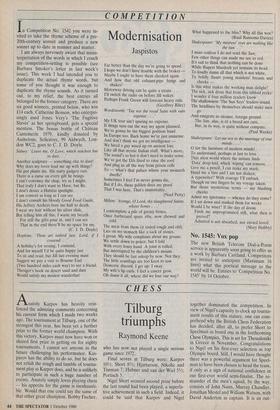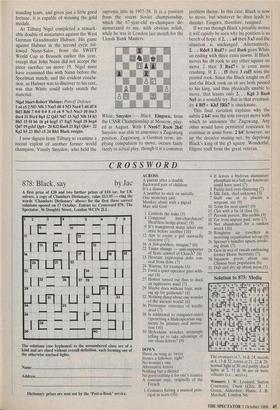CHESS
Tilburg triumphs
Raymond Keene
Anatoly Karpov has heavily rein- forced the admiring comments concerning his current form which I made two weeks ago. The tournament at Tilburg, one of the strongest this year, has been yet a further prize to the former world champion. With this victory, Karpov must now have won or shared first prize in getting on for eighty tournaments. I cannot see anyone in the future challenging his performance. Kas- parov has the ability to do so, but he does not relish the rough and tumble of tourna- ment play as Karpov does, and he is unlikely to participate in such a huge number of events. Anatoly simply loves playing chess — his appetite for the game is inexhausti- ble. Would that one could say the same of that other great champion, Bobby Fischer,
who has now not played a single serious game since 1972.
Final scores at Tilburg were: Karpov 101/2; Short 81/2; Hjartarson, Nikolic and Timman 7; Hubner and van der Wiel 51/2; Portisch 5.
Nigel Short secured second prize before the last round had been played, a superla- tive achievement in such a field. Indeed, it could be said that Karpov and Nigel
together dominated the competition. In view of Nigel's capacity to clock up tourna- ment results of this stature, one can com- prehend why the British Chess Federation has decided, after all, to prefer Short to Speelman as board one in the forthcoming Chess Olympics. This is set for Thessaloniki in Greece in November. Congratulations to Nigel on his first-ever selection as top Olympic board. Still, I would have thought there was a powerful argument for Speel- man to have been chosen to head the team, if only as a sign of national confidence in our first-ever world semi-finalist. The re- mainder of the men's squad, by the way, consists of John Nunn, Murray Chandler, Jonathan Mestel and William Watson, with David Anderton as captain. It is an out-
standing team, and given just a little good fortune, it is capable of winning the gold medals.
At Tilburg Nigel completed a remark- able double of miniatures against the West German Grandmaster Hubner. His game against Hubner in the second cycle fol- lowed Nunn-Salov, from the SWIFT World Cup in Brussels earlier this year, except that John Nunn did not accept the piece sacrifice on move 19. Nigel must have examined this with Nunn before the Speelman match, and the evident conclu- sion, as Hubner was to discover to his cost, was that White could safely snatch the material.
Nigel Short-Robert Hubner: Petroff Defence.
1 e4 e5 2 Nf3 Nf6 3 NxeS d6 4 Nf3 Nxe4 5 d4 d5 6 Bd3 Bd6 7 0-0 0-0 8 c4 c6 9 Nc3 Nxc3 10 bxc3 dxc4 11 Bxc4 Bg4 12 Qd3 Nd7 13 Ng5 Nf6 14 h3 Bh5 15 f4 h6 16 g4 hxg5 17 fxg5 Nxg4 18 hxg4 Qd7 19 gxh5 Qg4+ 20 KM RaeS 21 Rgt Qh4+ 22 Kg2 b5 23 Bb3 c5 24 Rhl Black resigns.
I now digress from Tilburg to examine a recent exploit of another former world champion, Vassily Smyslov, who held the supreme title in 1957-58. It is a position from the recent Soviet championship, which the 67-year-old ex-champion de- monstrated to me, with obvious relish, while he was in London last month for the Lloyds Bank Masters:
White, Smyslov — Black, Eingorn, from the USSR Championship at Moscow, play- ed in August. With 1 Nxe6!! Rxe6 2h4! Smyslov was able to announce a Zugzwang position. Zugzwang, a German term, im- plying compulsion to move, occurs fairly rarely in actual play, though it is a common
problem theme. In this case, Black is now to move, but whatever he does leads to disaster. Eingorn, therefore, resigned.
If we run through Black's possible moves it will rapidly be seen why his position is so bereft of hope: if 2. . . a4 then 3 a3 and the situation is unchanged. Alternatively, 2. . . Rde8 3 Rxd7+ and Bxe6 gives White an ending with three extra pawns. If Black moves his d8 rook to any other square on move 2 then 3 Rxd7+ is even more crushing. If 2. . . f5 then 3 exf5 wins the pinned rook. Since the Black knight on d7 and the Black rook on e6 are both pinned to his king, and thus physically unable to move, that leaves only 2. . . Kg6 3 Bxe6 Ne5 as a sensible try. But in that eventual- ity 4 BfS+ Kh5 5Rh7 is checkmate.
This final variation explains why the subtle 2 h4! was the sole correct move with which to announce the Zugzwang. Any other would have permitted resistance to continue in some form. 2 h4! however, set up the decisive mating net, by depriving Black's king of the g5 square. Wonderful, filigree stuff from the great veteran.



































































 Previous page
Previous page